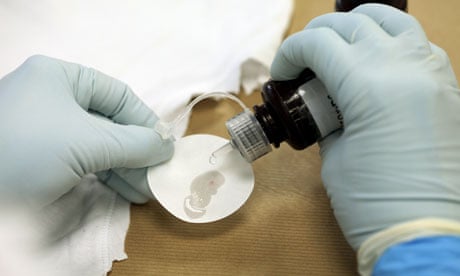A man who was wrongly charged with rape was the "innocent victim of an avoidable contamination" at a private forensics laboratory, an official report concludes.
Adam Scott, 20 was falsely accused after a plastic tray that should have been disposed of at a laboratory run by LGC Forensics was reused in the analysis of a swab taken from the rape victim.
Scott spent five months on remand over the Manchester attack, even though mobile phone records suggested he had been 280 miles away in Devon shortly afterwards.
The report [pdf] from the forensic science regulator, Andrew Rennison, concludes that a plastic tray containing a sample of Scott's DNA, which had been taken for an unrelated matter, was re-used in the analysis of a swab from the rape victim.
Rennison said: "The contamination was the result of human error by a technician who failed to follow basic procedures for the disposal of plastic trays." He said the fact that trays were reused had been identified almost two weeks before Scott was charged, and there should have been a "more comprehensive" response at that point.
The regulator said 26,000 samples had been processed before the flaw was spotted, but he was satisfied there had been no further cases of contamination. The report reveals that following the rape, samples were sent to LGC, which claims to be the largest provider of forensic science services in the UK. Tests at LGC's laboratory in Teddington, Middlesex, linked the sample to Scott.
LGC's report on the case said: "It is estimated that the chance of obtaining matching DNA components if the DNA came from someone else unrelated to Adam Scott is approximately one in one billion." Scott was charged with rape in October 2011 and remained in custody until March. The regulator's report says the sole evidence against Scott was a partial DNA profile developed by LGC at Teddington.
Rennison said: "I am satisfied that it was his profile though not from the samples taken from the rape victim, but introduced through the incorrect re-use of disposable plastic trays during the automated DNA extraction process at LGC. Scott's saliva from an unconnected earlier processed sample had been present in one cell of a tray that was re-used, with sufficient DNA present to contaminate the later rape sample."
He continued: "The re-use of the trays was the result of human error by an unidentified laboratory technician failing to follow the LGC operating procedures. LGC internal investigations identified and acknowledged the errors and failures in the issues set out above, procedures and training have since been improved, assessed and cleared as part of a wider annual assessment of LGC by the United Kingdom Accreditation Service."
LGC said it deeply regretted the incident. It said: "The forensic regulator and the accreditation service have expressed their satisfaction with our investigation into the incident, the corrective actions and LGC's overall contamination avoidance and checking processes."
